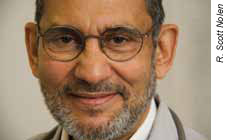BIHAR / Chicago, U.S.A :

Dr. Zia Usman is a rarity within the U.S. veterinary profession.
Not only does the Indian-born and -trained veterinarian own a companion animal practice on Chicago’s North Side, Dr. Usman is also a Muslim.
Such a combination is unusual among first-generation immigrants who are followers of Islam, according to Dr. Usman’s colleague, Riaz H. Siddiqi, a professor at Truman College in Chicago and president of the Muslim VMA.
The association believes approximately 500 Muslim veterinarians are in the United States. Dr. Siddiqi thinks most of them are employed in academia, research, industry, or government, where they are likely to be inspectors in slaughterhouses. Few Muslim veterinarians in the United States work with pets, he said, but this is more a matter of economics, not any Islamic taboo.
“Many of us who come here, we have families, and we’re in a hurry to find a job quickly, and we don’t have the time or money to go through the certification process,” Dr. Siddiqi explained.
Growing up in India, Dr. Usman was expected to become a physician like his father, yet his “heart was inclined toward animals,” he said, so he enrolled at the Ranchi College of Veterinary Science and Animal Husbandry in Bihar.
Two years after graduating in 1970, Dr. Usman immigrated to America. His first job was as a laboratory animal technician at the University of Illinois Biological Resources Laboratory in Chicago.
In time, Dr. Usman passed the AVMA Educational Commission on Foreign Veterinary Graduates certification program, became assistant director of laboratory animal resources at Northwestern University College of Medicine, and got his veterinary license. In 1992, he left laboratory animal medicine to open a private practice in Chicago, allowing him to work with pets and educate the public about Islam.
The Muslim community is well-established in Chicago, but Sept. 11 raised its visibility and put Islam in a negative light. “Now people know more about Muslims and Islam, and, unfortunately, they’re not knowing in the proper way,” Dr. Usman said. The media portrays Muslims as terrorists when “it’s just the opposite,” he said.
Muslims understand why Islam is one of the world’s fastest-growing religions, according to Dr. Usman. Islam, he said, is a peaceful religion that details man’s obligations to animals, especially the slaughter of food animals. Muslims are admonished not to slaughter an animal in front of other animals, for instance, and to end an animal’s life quickly and with as little pain as possible. There are even instructions on how a Muslim is to hunt humanely. “Every step of the way, we have religious guidance,” Dr. Siddiqi noted.
A common misconception is that Muslims shun dogs as unclean animals. Neither Dr. Usman nor Dr. Siddiqi is an Islamic scholar, but they say their faith does not prohibit Muslims from dog ownership. In fact, Dr. Usman owned a German Shepherd Dog as a teenager. “That was my baby,” he recalled. “I would take care of him and cook for him.”
Dr. Usman cited a popular account in the Hadith—a collection of narratives based on the words and deeds of the prophet Muhammad and, in addition to the Quran, one of Islam’s primary sources for instruction. According to the story, a man took pity on a thirsty dog by giving it water from a shoe. “Allah approved of his deed and made him to enter Paradise,” the story goes.
When Dr. Usman came to America, he didn’t know what to expect. So in 1999 he helped found the Muslim VMA to give Muslim veterinarians coming to the United States information he didn’t have. In addition to providing career advice, the association helps Muslims find halal food, that is, sources providing food that complies with Islamic dietary laws. The Muslim VMA wants to eventually start its own halal certification program.
Dr. Siddiqi said the association is planning to hold a meeting in Chicago of Muslim veterinarians and is hoping to network with human physicians to strengthen efforts at preventing the spread of zoonotic diseases.
source: http://www.avma.org / AVMA / Home>> JAVMA News / February 10th, 2010 / by R Scott Nolen / February 01st, 2010








